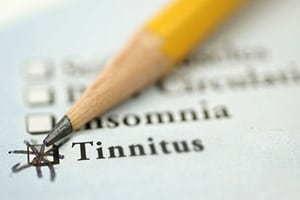
Tinnitus is defined as hearing noises in the ear(s) or in the head. It is a widespread condition that affects an estimated 50 million Americans. Some people describe their tinnitus as a ringing, hissing, roaring, whooshing or buzzing sound in the ear. It may be sporadic, or it may be constant. Tinnitus is a symptom rather than a disease itself.
Understanding the Facts
- Tinnitus sounds different to everyone. Sounds can vary in volume and may present as a buzzing, humming, whistling or other noise.
- Tinnitus and hearing loss go hand in hand; 90 percent of those suffering from tinnitus also have some degree of hearing loss.
- Around 60 percent of veterans returning from war report tinnitus.
- More than 200 drugs are known to have tinnitus listed as a side effect.
- Stress and anxiety may contribute to tinnitus.
- There are several groups of people who are at higher risk of developing tinnitus: those who work around loud machinery, musicians, hunters, senior citizens, military personnel and cancer patients receiving chemotherapy.
What Are the Causes of Tinnitus?
Tinnitus is not a disease itself, but rather a symptom of an underlying health condition. Most commonly, tinnitus is a symptom of untreated hearing loss.
Some of the many different health conditions that have tinnitus as a symptom include:
- Presbycusis (age-related hearing loss)
- Noise exposure
- Impacted earwax
- Ear infections
- Otosclerosis (stiffening of the bones in the middle ear)
- Meniere’s disease
- TMJ disorders
- Ototoxic medications
- Head or neck trauma
- Acoustic neuromas
- High blood pressure
- Head and neck tumors
- Blocked arteries
- Thyroid conditions
How Is Tinnitus Treated?
Tinnitus can’t be cured, but there are treatment options that make it less of a distraction. The approach to be taken depends on the underlying condition responsible for the ringing in your ears. For individuals with hearing loss as the underlying condition, hearing aids are the best treatment plan.
Counseling, cognitive, behavioral or relaxation methods can be practical in helping you manage your tinnitus symptoms by reducing the stress, anxiety and sleeplessness that are often associated with tinnitus.
Others benefit from noise suppression therapy or masking techniques designed to cover up the noises heard. White noise machines, fans, air conditioners and humidifiers are also popular and easy to use options.
Call Great Lakes ENT Specialists at (231) 489-8151 for more information or to schedule an appointment.